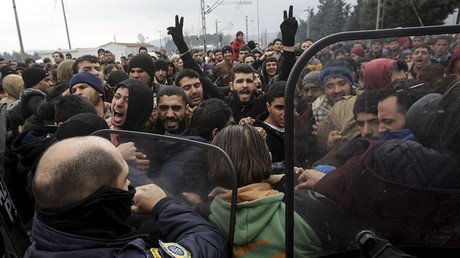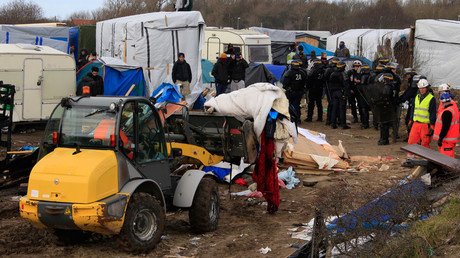Only traffickers & smugglers benefit from EU’s anti-migrant barriers – IOM spokesperson to RT
By creating artificial barriers to keep out migrants instead of letting them reunite with their communities, Europe only aggravates illegal smuggling, a spokesperson for the International Organization for Migration (IOM) Joel Millman told RT.
RT: How would you describe the humanitarian situation in Europe right now?
Joel Millman: We regard it with concern and we wait patiently to see how European countries can accommodate each other as well as the migrants coming through. Last year was a very hard year and we expect 2016 to be equally difficult, but we hope that progress is being made and the countries are coming to some kind of synthesis on how to proceed.
READ MORE: Refugees stuck at Greece-Macedonia border. What’s the solution?
RT: We have seen European countries trying to help the migrants, trying to respect their human rights, but we have also seen European countries trying to kick them out, trying to fence them off. How do you see Europe as a whole trying to manage this crisis?
JM: The 28 members of the EU are certainly IOM members and we know how difficult this is for them. And we have been saying consistently that barriers are only an aid to traffickers and smugglers. When you make passage difficult you force people who are coming from desperate situations and are only pursuing safety into bad decisions. Bad decisions like linking up with criminal groups who have less regard for their well-being than the governments do. And of course the extreme case of last year of 71 people found killed in a truck from suffocation in Austria. We see these boats which killed almost 4,000 people last year in the Mediterranean as examples of the consequences of barriers and illegal or irregular migration. So we certainly hope that governments consider all those consequences when they erect fences or make passage impossible.
RT: We’re seeing the likes of Macedonia putting up fences with thousands of migrants simply becoming stranded in Greece. How fair is it or unfair on Athens to be expected to deal with all of these people?
JM: That of course is a crucial question. In the years past the numbers were so small it was easy to insist on certain regulations like seeking asylum in the first country that they arrive in. This [was] obviously [part of] a wave where over one million people came to Europe last year, from Africa and the Middle East and beyond, is really a test to the resolve and efficacy of those kinds of rules.
Of course countries have the right to protect their borders. In fact they have an obligation to protect all of us from unwelcome types coming in. However the vast majority of these migrants are families fleeing terror and terrible civil disorder. So we hope that some kind of a happy medium can be found. There was progress last year, there were things done that we saw as really positive steps and we just await a greater kind of consensus from the very countries which are destinations for these really desperate people.
RT: If these people are fleeing really life threatening situations, they make it Europe, and say they landed in Italy and Greece, shouldn’t they be grateful just to be somewhere safe where they will be looked after? Why are they heading North? Should they be staying where they first landed? Shouldn't that be enough?
JM: It is a reasonable question. But we believe that most of these migrants have a reason for going into these various countries. The principle reason would be family reunification. And we think in the medium term and the long term that is the most effective way of integrating them into their new homes. They’ve got communities there, they’ve got relatives there. The easiest thing for all European countries would be to let people join their own families who will then share the responsibility of settling them and finding work, and integrating them into this strange new continent for them trying to make new lives in. Your question is worthwhile, but if somebody is in Italy or Greece at the cost of the tax payers there and they have a brother, a cousin, or a parent in the UK or Scandinavia, I think you would agree that the best way for that person to cease to be a costly addition to the society is to let them be with their family where together they can work through the integration and assimilation process. It has always been this way in migration.
The US has repopulated almost a million people from South East Asia in the ‘70s and ‘80s. And they tended to scatter them all over the US and eventually they all found each other in these cities and began to form real communities. The case for example of Hmong people from Thailand and Laos, they went to Fresno, Minnesota, places like that where large communities of that nationalities were forming on their own.
So we regard what is happening in Europe now as part of that kind of trend. Right now it makes a lot of sense to be with your family. If that family is in Sweden you should be there I think more than you should be in a reception center in Sicily, costing tax payers there and European tax payers as a whole, the cost of getting them on their feet and starting new lives.
The statements, views and opinions expressed in this column are solely those of the author and do not necessarily represent those of RT.














